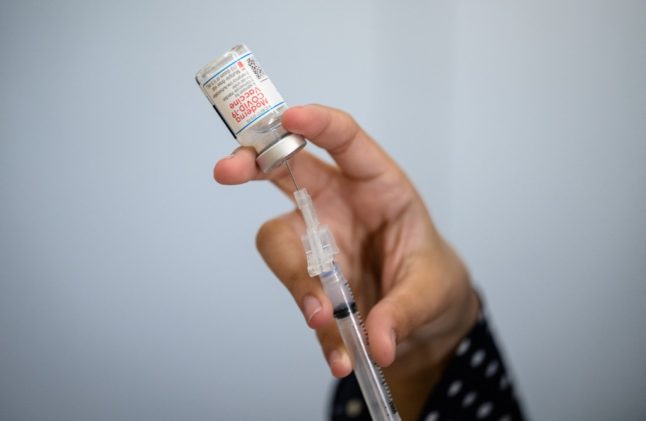On Monday, Federal Office of Public Health (FOPH) said it will start vaccinating at-risk people against Covid in mid-October.
According to internal documents, authorities are ordering 1.3 million vaccine doses from each of manufacturers Moderna and Pfizer. In addition, a delivery from Novavax and another from Moderna are expected in October, according to CH Media.
READ ALSO: Switzerland’s Covid vaccine programme to restart in autumn
What Covid variants have been detected in Switzerland and are they dangerous?
Currently, there are two: the Eris variant (EG.5) and Pirola (BA.2.86),
Pirola spreads faster than Eris and is under increased surveillance by health authorities.
While both variants are contagious, so far there are no signs that they are as dangerous as Alpha and Delta strains that had become predominant during the pandemic’s peak.
“Compared to the pandemic years 2020 and 2021, the situation has changed significantly: among people under 65 who do not have risk factors, the probability of a serious form of Covid-19 is minimal,” FOPH said on Monday. “Among vulnerable people, on the other hand, the risk is significantly higher.”
FOPH identifies ‘vulnerable’ people as those over 65, as well as individuals suffering from cancer, diabetes, heart problems, serious respiratory impairments, and other chronic diseases, along with those whose immunity system is weakened.
What can we expect, Covid-wise, in the fall and winter?
According to FOPH, the variants currently in circulation present new mutations which “partially escape the immunity acquired by the population. Additionally, the protection afforded by vaccination (or previous infection) gradually diminishes over time.”
Due to these two factors, to which will be added increased contact in indoor spaces, the FOPH expects an increase in the number of infections this fall and winter.
Overall, however, epidemiologist Andreas Cerny expects fewer serious cases than in previous years, especially among people who are not in high-risk groups (as mentioned above).
In terms of measures, keeping distance, testing, or wearing a mask are not currently on the agenda for population at large.
However, according to Christoph Berger, head of Switzerland’s Vaccination Commission, it would make sense if everyone took precautionary measures for themselves.
“Anyone who is contagious should either stay at home, wear a mask, or keep their distance to protect others,” he said. “You should use common sense. If you cough badly, you shouldn’t go visit your grandmother.”
Why is Covid still around?
“Just as there are always new epidemic waves with flu or other viral respiratory diseases, Covid infections are also increasing from time to time, probably several times a year for the time being and especially in autumn. We have to come to terms with that,” epidemiologist Christian Althaus from the University of Bern said in an interview.
Should you get vaccinated?
Whether you have already had Covid vaccines in the past (one vaccine and three boosters have been given in Switzerland since the end of 2021), or haven’t had any shots at all, FOPH said the new doses will protect vulnerable people from developing a serious form of the disease.
Will the vaccine be mandatory?
As during previous coronavirus waves, the government will not make vaccination mandatory.
It will remain a recommendation.
Who will pay for the vaccination?
FOPH has not said, but in previous campaigns, shots were free of charge for residents of Switzerland.



 Please whitelist us to continue reading.
Please whitelist us to continue reading.
Member comments